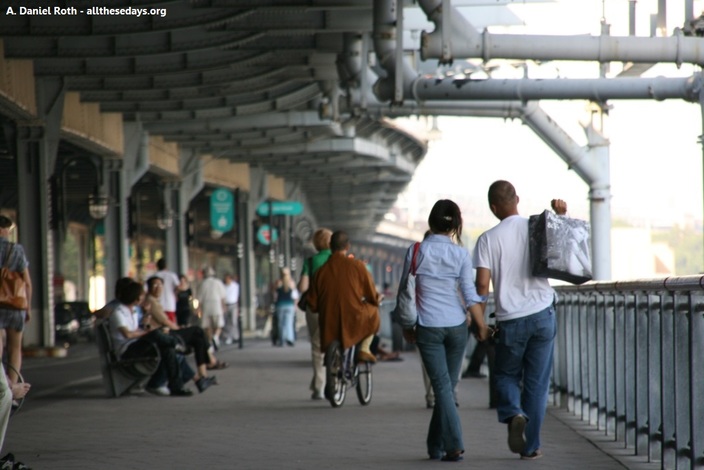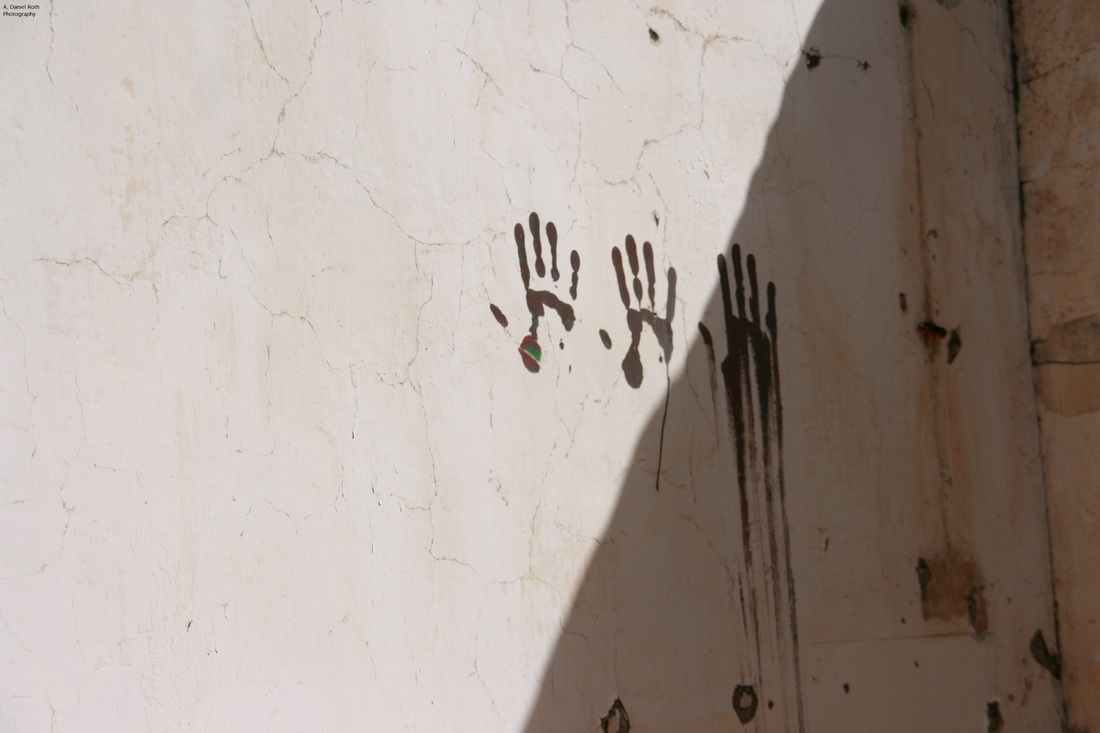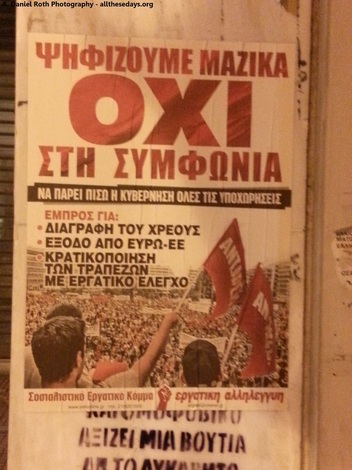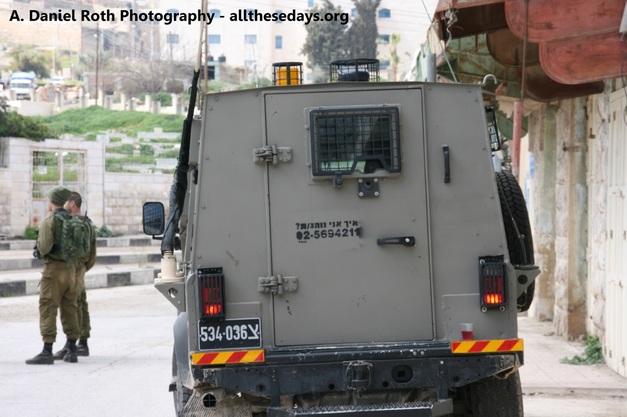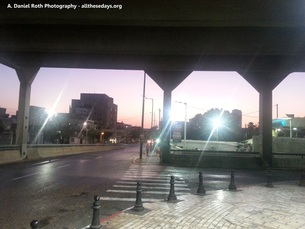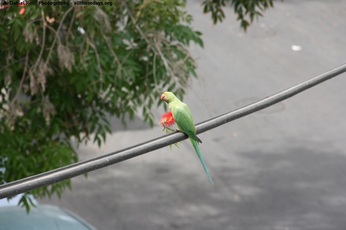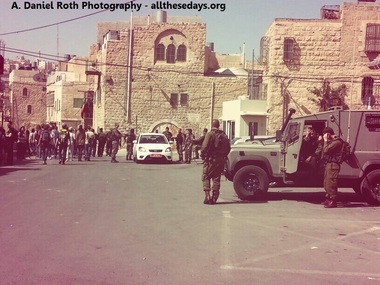|
With images on Israeli screens of wedding guests and Palestinian teens, wielding knives and eyes aiming to kill, I walk through Jaffa and South Tel Aviv with my hood on and headphones in, listening to the history of debt – a book on tape – and passersby pass by me, and look scared of me, without a full view of my face. Some of them must think I’m a monster willing to do anything, and some of them must guess that I’m on their side.
It’s unclear if I’ve ever been viewed this way before. There is terror in those eyes and nearly everyone feels it. Terror at the sight of a human being is a learned response. Images, experience and text books teach them that fear is the root of hate and the plant that grows is mandatory at celebrations of their pain and lamentations of our own.
1 Comment
There is no movement. Violence elicits attention. Nothing really shifts. Just failed policies and increasingly bad news. A violent act, and revenge. The world closes and a heavy weight enters the atmosphere above Israel and Palestine.
Police move in and anger erupts in the days ahead. Boots on the stone steps. Suspicion reigns and policy tightens around legs and necks. Terror is random and it is policy. Violence, pain and occupation become the dimly lit hospital in which generations are born and the cemetery in which they are buried. Movement seems far, far away, and nothing moves unless millions move it; a mass stand against this sick steel netting. Not tomorrow and not when it seems safe. I was in Athens to report on the referendum. It was extraordinary.
This post originally appeared at allthatsleftcollective.com
“How's my driving?” The question was spray painted on the back of an Israeli army jeep driving in Hebron. Occupied and barred from walking streets and unable to believe that it is not the post-apocalypse. Palestinian peoplehood and Jewish peoplehood and hoodlums and hooded fangs and BDS and Zionism and the unclear marked line ironically drawn all over our dinner tables and houses of worship and houses and warships, and everywhere except our maps. I posted this at Znet on October 5th, 2011 with the aim of gathering people to join 'Occupy Toronto' as the world was taking note of the (somewhat surprising) success of Occupy Wall Street. I had been living in New York City for a number of years, organizing on these issues and taking part in some of the precursors to OWS. By September of that year I was staying in Toronto as I was getting ready to move to Tel Aviv. I recently stumbled upon this post again. Though our movements look different today, most of the below is still important as we move forward. I have to begin this piece with an explanation: I have been politically active for most of my life. I have always believed that radical change is possible and within our reach. Unfortunately, in recent years I have had to contend with an inner cynicism, but as I look around at what's happening right now that cynicism is dying. I know that there are plenty of people reading this who dream of a better world, but just don't think that reality can catch up to our dreams. I know that feeling. I know now that Cynicism is not truth. Sometimes cynicism can protect us from taking dangerous leaps forward, but it is not truth. Cynicism is easy, and that's what attracts us. The path that we are on is a hard one, but it is not impossible. It is that knowledge that can carry us forward. This year we have seen freedom struggles in every corner of the world. The fight has been brewing all along, but there is a new spark right now. There is a real fight going on. Fighting against dictators and fighting for jobs. Fighting to end racist policies and fighting to ensure that every person is healthy and able to reach his or her full potential. (Continued below the gallery) 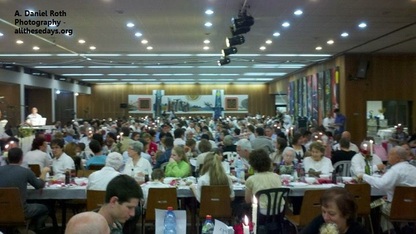 Passover at Kibbutz Mishmar Ha'emek, 2012 Passover at Kibbutz Mishmar Ha'emek, 2012 This also appears at Jewschool.com What’s this all about? Kvutzat Orev is a group of 6 people who built a communal Jewish life, rooted in Hashomer Hatzair, together in Israel and Brooklyn over 5 years. For the last 3 years we have been exploring different paths. Some in Israel and some in Brooklyn. During a group seminar last Spring we decided to start building a new, Jewish, and public Pesach (Passover) ritual. We have been meeting digitally every few weeks, researching our history and tradition, and developing a common language around goals and values. What follows, a version of the 4 glasses of wine that we drink throughout the Pesach Seder, is an amalgam of the values we set out to embody and some ideas for the rituals that may work with those values. Our process is continuing as we look for questions that need answering through collective culture and build a renewed way of understanding ourselves our people and our role in the world. Collective Belonging - Birth Eyes open to our role in the world as a collective force. We touch the freedom of self-determination in its infant and infinite forms. We seek family and we transmit culture from person to person and generation to generation. We are born into identity as we realize our lives are tied to the people and things around us. We engage in argument for the sake of heaven and we follow a path of learning and growth in Chevruta. We pray, eat, celebrate, question constantly and grow with others and when we touch self-determination we touch equality and oneness; the connected nature of the universe as the root idea in monotheism in Judaism. 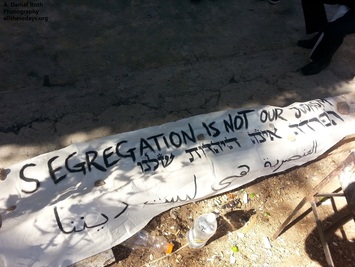 Sign from a diaspora-led protest in Hebron, 2013 Sign from a diaspora-led protest in Hebron, 2013 This piece was originally published at +972 Magazine. The way the world is talking about the Israeli occupation is changing. Alongside that change, opportunity is knocking for those of us standing in opposition: calls for diaspora Jews to be present on the ground in Israel and Palestine are increasing. An important shift is beginning to take place — right now. The writing is on the wall. Since Prime Minister Benjamin Netanyahu was re-elected, U.S. President Obama and his staff have been speaking differently about the once-incontrovertible two-state solution. One campus Hillel changed its name instead of changing it’s programming to adhere to Hillel International’s rules. If Not Now stormed onto the scene last summer in response to the violence in Gaza. Boycotts and BDS campaigns are sprouting up on campuses and at supermarkets all over the world. 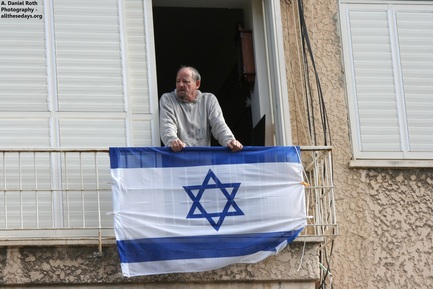 This post originally appeared at Jewschool.com Israeli Prime Minister Netanyahu's extra dose of racism in this election will most likely translate into street violence and worse for Palestinian Citizens of Israel, other minority groups in Israel, Palestinians under occupation and Leftists. When the man, referred to by his followers as "Bibi, King of Israel" makes racism the norm you can bet it will flow into every corner of the country and it's occupied territories. When the final campaign effort is a reaffirmation of eternal occupation you can bet that hope for self-determination will be lost for millions. When last summer's bloody 'operation' in Gaza gave way to street violence by “Kahanist” thugs, you can bet the collectively-expected next 'war' will lead to much, much worse. When the ruling party oversees the massive growth of inequality and more than 2 million live below the poverty line, and still they are thrust to victory, you can bet that life will get harder and harder. The only way forward is to build our movement to be courageous in its vision for ending the occupation, building equality and peace, and seeking justice, and to establish, here and now, that the above is necessary for the prosperity we all seek. This movement has to be strong enough to withstand the attacks ahead, both physical and political. We must move forward with foresight and develop a strategy, and it has to (re)start today. This article was translated from English to Hebrew and published at "Local Call/שיחה מקומית". The original English version was published at +972 Magazine. הייתי שמח להצביע למפלגה שאני מאמין בה. אבל אם אני, שהגעתי לארץ רק לאחרונה, יכול להצביע, בעוד שמיליוני פלסטינים שנולדו כאן לא יכולים, אז יש בעיה בדמוקרטיה הזאת. לכן אני צריך לתרום את קולי למי שצריך אותו 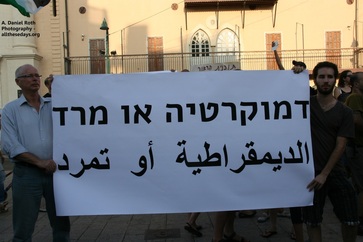 כותב אורח: ע. דניאל רוט מיליוני אנשים ילכו לקלפיות ב-17 במרץ כדי להחליט מי ייצג אותם בכנסת הבאה. מיליונים אחרים לא יוכלו לעשות זאת. מתוכם, כ-4.5 מיליון פלסטינים חיים תחת כיבוש ותחת מצור בגדה המערבית, מזרח ירושלים ורצועת עזה. למיליונים האלה אין שום זכות להצביע לממשלה שמכריעה את גורלם בפועל. העובדה שמיליוני אנשים חיים תחת שליטה ישראלית ללא כל ייצוג פוליטי בה וללא זכויות אזרח בסיסיות היא עלבון לעצם הטענה שיש כאן דמוקרטיה. לכן אני עומד "לתת" את הקול שלי בבחירות הקרובות (הראשונות בהן אשתתף אי פעם) לאדם אחר, שחי תחת המשטר הצבאי. אני אפנה לחבר שחי בשטחים הכבושים, אשאל במי הוא תומך בבחירות האלה, ואצביע בהתאם לבקשתו. 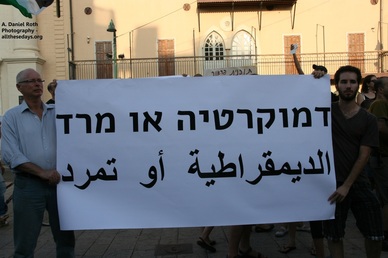 "Democracy or Revolt" "Democracy or Revolt" This was originally published at +972 Magazine. It was also translated into Hebrew and published at "Local Call/שיחה מקומית". Millions of people will go to the polls on March 17th to decide who will represent them in the next Knesset. Millions more are not able to. Among them are approximately 4.5 million Palestinians who live under occupation and siege in the West Bank, East Jerusalem and Gaza. Those millions of people do not have the right to vote for the government that, at the end of the day, decides their fates. The fact that millions of people live under Israeli rule without representation or basic civil rights is an affront to the very idea of democracy. That’s why I am going to “give” my vote in the upcoming election (the first in which I am eligible to vote) to someone living under occupation. I will consult with, and observe the wishes of, a friend living in occupied territory. 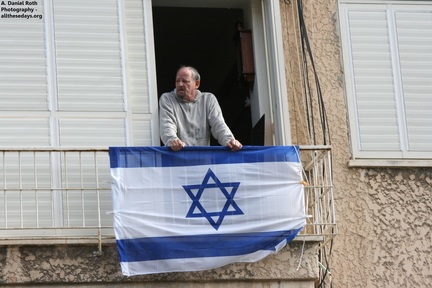 To call a state a democracy requires that the people choose their political representation and that the state protects a set of rights that everyone has access to. There are many frightening things about the so-called “Jewish Nation-State law”, which puts Israel’s Jewish character out in front of democracy by a long shot and we very well may see this bill become law. So far, the bill was already approved by the cabinet in a vote of 14-7, and was set to hit the Knesset floor this Week, but Prime Minister Netanyahu has postponed it until next week. The bill, which is meant to become a Basic Law (the closest thing Israel has to a constitution), is scary because it emphasizes Jewish privilege under the law in Israel, for example pushing Jewish law into the secular court system and demoting Arabic from one of two official languages down to merely being the mother tongue of 20% of the population and the regional language. If we are killed, be it terrorism or just murder; If we are stabbed, bombed, run over, or burned to the ground where we stand; If we are cut down one of these days or all of them; If we are the victims of a person or a system If then our ashes are turned into ammo, That would be terror. This piece also appears here. 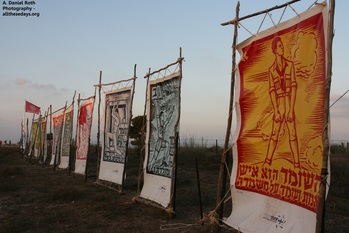 This piece originally appeared in Jewish Currents Magazine. WHEN I MOVED TO ISRAEL THREE YEARS AGO, one of the questions asked of me was “What kind of Jew are you?” My answer was “Shomer” — that is, a member of Hashomer Hatzair, the Socialist-Zionist movement. A few bureaucrats along the way tried to get me to change my answer to Reform or secular or unaffiliated, but I pushed back. I grew up in the community spaces of Hashomer Hatzair. My heroes were the people who fought back during the Shoah — many of them members of the movement, such as Abba Kovner and Mordecai Anielewicz — as well as “our” thinkers, such as Martin Buber. Growing up in the Socialist-Zionist movement as a member of Hashomer Hatzair in North America, I was exposed to education about Zionism, Israel, oppression, justice, and identity. This education was far less focused than it once was on aliyah (moving to Israel) to build a kibbutz. Instead, the focus was on developing critical thinking through the lens of a leftist Zionism among youth who had a sense justice and of Jewish identity. Yet many of the historical ideologies and identities at the core of our history were very much in the background, quietly guiding the education in which we took part. 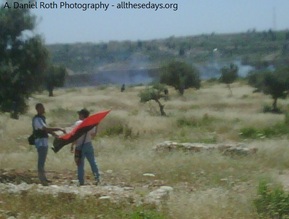 Word is that SodaStream is packing up their factory in the occupied territory and heading to the Negev desert in Israel. A piece at ShalomLife.com takes aim at the BDS movement, which took aim at SodaStream this year, imagining what might happen if SodaStream packs up and leaves behind the hundreds of Palestinian workers who make a living at the factory. The article, of course, has a disclaimer at the bottom, presumably tacked on after a large number of comments pointed out that this particular piece of Hasbara (“advocacy” in Hebrew) had jumped the gun, given that the the official announcement is yet to be made and there is no word as to what SodaStream will do regarding their Palestinian workforce. It is actually rather funny to have an entire article dedicated to an imaginary scenario, which then is noted as imaginary in a disclaimer at the end. Here it is: Sometimes I feel like there are all these peace agreements for sale and no one’s buying. We’ve got two states, one state, unions, federations, long term, short term and more. Get ‘em while their hot! Bibi’s not buying and Hamas sure ain’t interested. Abbas is like a man at a mall minutes before closing with credit card in hand – no idea which product can fit in his station wagon; the proprietor eyeing him to leave. People keep asking what the alternative is to violence, “we have to kill and die, there’s no other choice!” Humanity knows when that is the case and when it sure isn’t. Those filled with love and pain – commitment to their people and in solidarity with all other peoples – tend to reluctantly make it clear that it may be a time when fighting may be necessary.
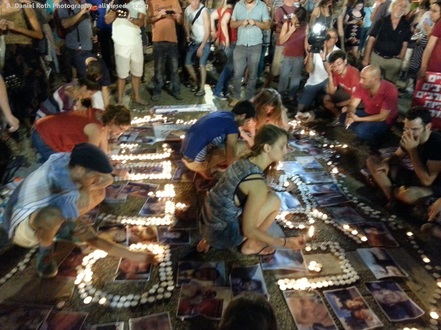 "Forgive us" written in candles at 7000 person demo against war. Tel Aviv July 26, 2014 "Forgive us" written in candles at 7000 person demo against war. Tel Aviv July 26, 2014 This is the second part of a 2 part letter. The first part can be found here. A few days ago I wrote to a friend that it feels, the world over, that we are seeing a dark cloud and some are looking for a fight with some “other” as a response to that. I doubt that there is some definable good and evil in reality, but if there is it is most likely a divide between those looking for violence and those looking for peace. The problem with that theory is that the truth is that there is no such thing as violent “thugs”; there is only us. Life would be much easier if we were fine with the world as it is. We could be firmly focused on taking of only ourselves? After all taking care of only one’s self is built into the ideology of the current power structures – and a core component of the pain inflicted on us by capitalism, racism, and supremacist ideologies. 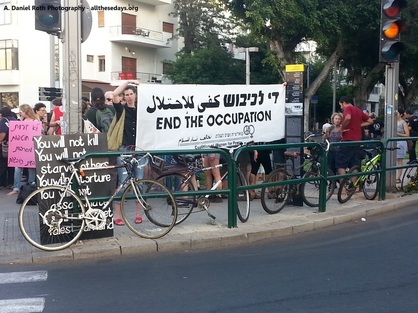 Tel Aviv demo against Occupation and growing violence. July 2014 Tel Aviv demo against Occupation and growing violence. July 2014 Much of this is taken from an email to a good friend. This is the first part of a 2 part letter. The second part can be found here. I am glad that you got this conversation started. I need to be thinking this way about making a positive impact on the world as humans and as Jews. I have been working hard lately, getting the next round of “Achvat Amim” participants ready, and covering the situation from the border areas with Gaza, Ashkelon, and Tel Aviv. I’m sorry it took me this long to write back. I’ve been learning an enormous amount about me and about the media. Writing and sitting in the studio gives you a chance to go through an analytical process, not a complete one – TV may not be built for thorough analysis at all – but something. Being in the field involves a lot more communication about what you see around you, what others say around you, and how it feels. It’s a strange and interesting world. The other day, I was walking to work and cool breeze, unusual for July, was blowing in from the West. It reminded me that I needed to write you back and it reminded me of all the pain and progress over where you are and the overbearing feeling of chaos over here. This originally appeared at Jewschool
Explosions Currently, Israel is engaged in a Gaza-Southern Israel back and forth of rockets and airstrikes. A teen was killed in a Golan Heights explosion originating from Syria and Israeli Forces are responding with fire on pro-Assad fighters. Goals Israel still hasn't found the 3 teenagers who are presumed kidnapped since they went missing on June 12th (though they have found other young people). Neither has anyone presented any evidence that it was, in fact, Hamas as the government claims. This article was originally published in +972 Magazine.
Both BDS supporters and detractors are touting the Presbyterian Church’s divestment vote as a BDS victory. But regardless, isn’t it a step in the direction every anti-occupation person ought to be rooting for? The Presbyterian Church U.S.A. (PCUSA) narrowly (310 to 303) voted late last week to divest some $21 million from Caterpillar, Hewlett-Packard, and Motorola for profiting by selling goods which are used in the administration of the occupation and the destruction of Palestinian homes and property. The full text of the divestment resolution can be read here. Strangely enough, or perhaps quite expectedly, both BDS activists and anti-BDS activists are touting this as a victory for the global boycott movement. The former are doing so with glee, saying that the Presbyterian divestment is a step in the right direction. The latter are shaking their fists with anger saying that people will see this as a BDS victory. 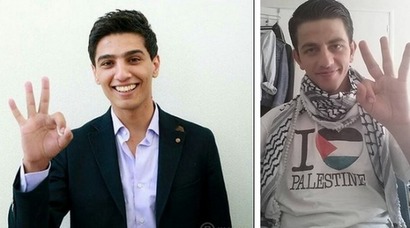 The comparison photo taken from AlQadi's facebook page. The comparison photo taken from AlQadi's facebook page. This article originally appeared in The Forward. Since the kidnapping of three Israeli teens last Thursday, the Israeli media has been engaged in a full court press to fill in the blanks and tell a compelling story — whether or not it’s true. Today, I came across a Facebook post from Mohammad AlQadi, a Palestinian student and activist living in Lyon, France. His picture had been posted (without permission) to an article in Walla, a major online news source for Israelis. The article reports on a campaign to support the kidnappers by holding up three fingers as if to gloat that three Israelis have been abducted. According to AlQadi, the photo of him with three fingers up was taken last year. The three fingers that he was holding up were related to last year’s Arab Idol winner Mohammed Assaf, a Palestinian singer born in Gaza. The three-finger salute in that context refers to the campaign to vote for Assaf on the show by choosing option 3. |
Archives
May 2022
|
© 2022 A. Daniel Roth
 This work is licensed under a Creative Commons Attribution-NonCommercial-NoDerivatives 4.0 International License. |

